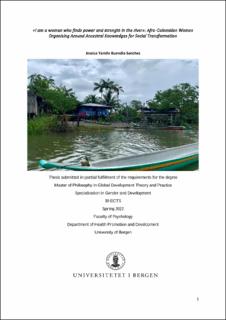«I am a woman who finds power and strength in the river»: Afro-Colombian Women Organising Around Ancestral Knowledges for Social Transformation
Master thesis
Permanent lenke
https://hdl.handle.net/11250/2999672Utgivelsesdato
2022-06-03Metadata
Vis full innførselSamlinger
- Master theses [165]
Sammendrag
Afro-Colombian women from the Pacific region of Colombia embody and defend their ancestral practices and knowledges. This is reflected in their grassroots movements. At the same time external actors deploy their development projects and programs in the territories these women inhabit, and make women target of those interventions. This research explores the role of ancestral knowledge for women’s individual lives and collective organising. Moreover, it explores the relationship between ancestral knowledge, gender relations, and development processes. Based on findings generated through field observations and six semi-structured interviews, I propose a decolonial analysis of ancestral narratives and embodied practices in rural and urban areas of the Pacific Coast of Cauca, focusing on a specific group of women and their networks. These women are all connected one way or another to Fundación Chiyangua which constitutes the case of this study. The findings indicated that ancestral knowledge was deeply rooted in the participants individual and collective lives. It was part of their identity that characterised them as unique, but also it was important for their collective struggles and their survival in a context of state neglect. Losing their knowledges would be to lose themselves. However, marginalisation pushed women to safeguard their knowledges and practices, in order to preserve their existence. Moreover, women promoted ancestral union and solidarity to struggle against gender hierarchies, but their struggles were complex and intersectional. Finally, while women’s vision of development was also associated to their ancestral values and knowledge, their interaction with non-state and state actors moved in a paradox: non-state development actors were assessed more positively than what the women viewed as imposed development by state-actors. Non-state actors seemed to be more sensitive to local needs and had comparatively contributed more to the women’s agendas for social change. From a critical perspective, I argue that the women’s ancestral practices and knowledges can be viewed as a political-epistemic insurgency to transform gender arrangements and to challenge experiences of dehumanisation based on forms of intersecting racialised, classed and territorial oppressions. Furthermore, the women’s engagement with development actors, reflects a colonial attitude from the Colombian state through top-down development interventions, but it also reveals how the women actively negotiate uneven power relations. A decolonial lens helps to understand the larger picture of the women’s struggle, and their agency in the face of the coloniality of power, coloniality of being and coloniality of gender to which V they are subject.
